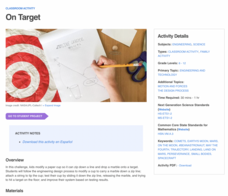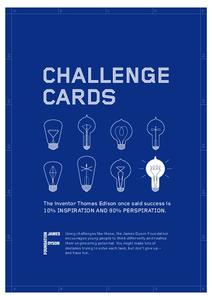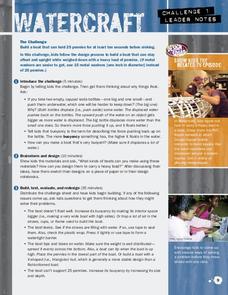DiscoverE
Tape Dispenser Challenge
Help your class get out of a sticky situation! Future engineers explore existing tape dispensers and then design a new system for dispensing tape. To put these systems to the test, they build and evaluate prototypes of their designs.
PBS
Pop Fly
A lever comes in handy when scholars build a launcher for a ping-pong ball. They test the launcher and redesign it to send the ball higher or to accommodate a tennis ball. This is the third lesson in a five-part unit.
Teach Engineering
Straw Bridges
Pairs work as engineering teams to design and build model bridges from drinking straws and tape. In this third segment in a series of 10, teams compete in an attempt to build the strongest bridge. To help with the design, the groups...
DiscoverE
Air Train
Train your pupils to be master engineers. Young learners design a train that travels along a fishing line. The train needs to safely carry pennies as passengers without falling out.
DiscoverE
Solar-Heated Water
Heat up some interest in solar energy. Young engineers create a water heater that runs on solar power (simulated by a lamp). Using thermometers, they determine the change in temperature before and after the water goes through the heater.
Teach Engineering
Chair Design
Can you design the perfect chair? Scholars apply the engineering design process to design and build a prototype of a new type of chair from wires. They test their designs with a wooden artist model or stuffed animal.
NASA
On Target
Crash into engineering by sending a marble to land on a target by way of a zip line. Using a zip line, pupils put engineering design processes into practice by modifying a cup to carry and release a marble onto a target. Scientists test,...
Teach Engineering
Protecting Our City with Levees
Teams use the design process to design, build, and test a model levee to protect the town from a wall of water. A handout provides a price list for the materials learners can use to build their levee within a budget.
DiscoverE
Build a Better Candy Bag
Every child's dream: stuffing as much candy into a bag as possible. Doing this, though, requires a nice sturdy bag. Scholars design the sturdiest bag they can and test the limits of those bag using a sweet treat!
DiscoverE
Keep-a-Cube
Waxed paper, newspaper, or aluminum foil? Keeping an ice cube from melting may require one or more of these materials. Learners design a box that will provide insulation so an ice cube stays intact for at least 90 minutes.
DiscoverE
Kinetic Sculpture
Let your creativity run wild. Scholars build a sculpture out of basic materials. These sculptures must be able to move in the wind (from an electric fan). However, they must also withstand the wind enough to not fall over—it's quite the...
DiscoverE
An Egg-Citing Ride
Wheeeee! Young thrill seekers build a bungee jump—not for themselves, though, but for an egg. The egg must fall from a height of five feet and rebound within two inches of the ground or floor.
PBS
Hidden Alarm
It's time! The fourth lesson in a five-part series has teams of scholars build a circuit for an alarm. A switch lets them turn the alarm on and off and allows them to hide the alarm—just as long as they don't hide it in the classroom!
James Dyson Foundation
Challenge Cards
Can you build it? Yes you can! This interactive game includes four design challenges presented on separate cards. The cards outline the challenges with limited restrictions but with an end goal in mind. The competitions include building...
PBS
Watercraft
Whatever floats your boat—with some additional weight. The first activity in a five-part series challenges pupils to design a boat to hold pennies. Using the design process, learners design, build, and test their boats, making sure they...
Teach Engineering
Building and Testing Model Underground Safety Caverns
Teams take their cavern designs and build a model from clay or paper mache that can be buried in sand. Testing involves dropping a bowling ball on the buried cavern. Teams dig out their cavern, inspect it for damage, and consider...
DiscoverE
Air-Powered Mini Rocket
Does the position of the clips make a difference? The activity provides directions to build and test a paper rocket. Pupils attach paper clips to the rocket in different configurations and measure the distance the rocket flies each time....
Institute of Electrical and Electronics Engineers
Water Fountain
Thorough instructions are given to guide you through making a demonstration hydraulic pump from two plastic soda bottles. After using the resource to teach your class about Pascal's and Bernoulli's principles, turn them loose in groups...
Teach Engineering
Stop the Stretching
Stretch your teaching repertoire with an experiment on the elongation (stretching) and failure (break) of several materials. The point of the experiment is to design a composite material for chair webbing.
Teach Engineering
Android App Development
Building an accelerometer app for your Android device. Groups develop an app that uses the accelerometer on an Android device. The purpose of the activity is to reinforce the programming design. The post activity assessment challenges...
Teach Engineering
Spool Racer Design and Competition
Wind it up and let it go. Individuals build a basic spool racer in the second portion of a six-part unit on energy. After receiving three criteria, pupils modify their designs to meet the new challenge. Pairs compete against each other...
DiscoverE
Emergency Shelter
Save yourself! Groups create a sturdy emergency shelter out of bamboo. The shelter must be large enough to fit one person. Now the most important question: Which member of the group gets to use the shelter in an emergency?
DiscoverE
Design a Catapult
Just this once, it's okay to throw things in class. Out of craft sticks and rubber bands, pupils build catapults to launch an object of choice. This can be a ping-pong ball, a marshmallow, or any other small item. As long as it hits the...
DiscoverE
Conveyor Belt
Convey your interest in conveyor belts. By considering different size tubes, groups create a conveyor belt that can transport boxes of candy at least four feet. Also, the conveyor belt must make a 90-degree turn—quite a difficult task!























